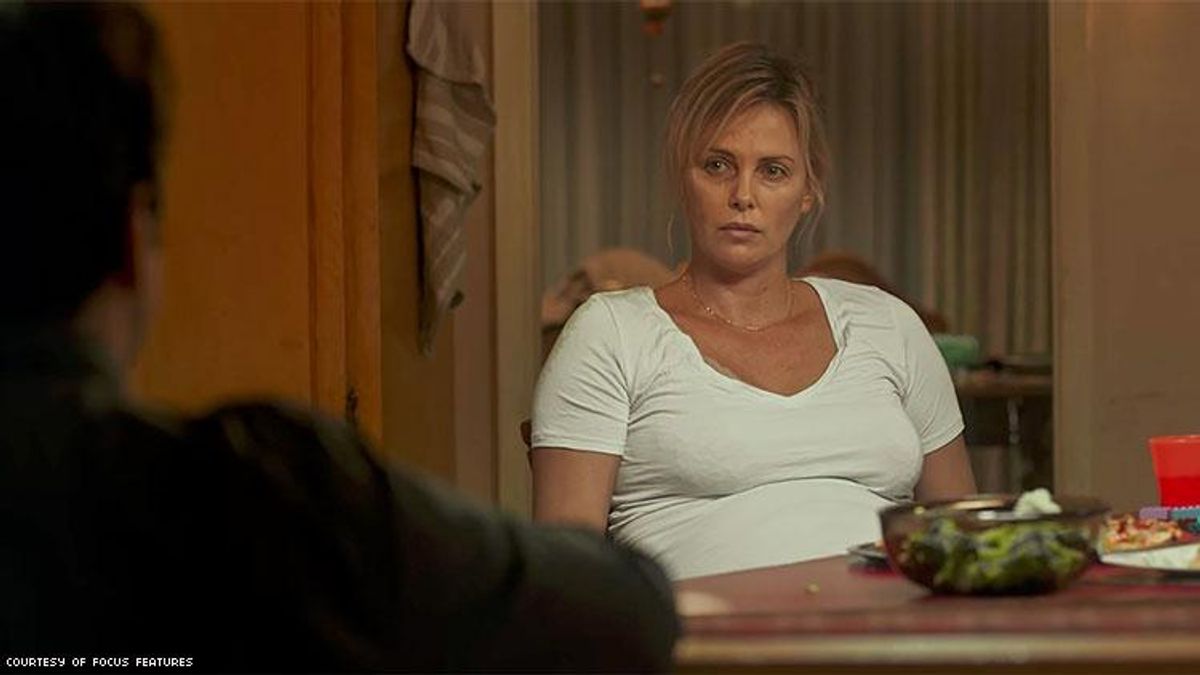At Sundance, a surprise premiere screening of the highly anticipated Tully, spearheaded by screenwriter Diablo Cody and director Jason Reitman, featured another unexpected joy -- a bisexual lead, played by Oscar-winner Charlize Theron.
Theron embodies Marlo, an exhausted mother who just gave birth to her third (and unplanned) child. Her husband is pseudo-involved, her five-year-old son struggles with undiagnosed emotional problems, and days before delivery she runs into the love who ruled her long-gone twenties: another woman.
The film subtlety features Marlo's bisexually without making an issue of it, presenting Tully as a rare film where LGBT characters are allowed to exist outside their queer identities, or in Marlo's case, struggle to keep going.
On the brink of an emotional breakdown, Marlo's affluent brother gifts her a night nurse (Black Mirror's "San Junipero" episode's star Mackenzie Davis) who goes by the film's name. At 26, Tully can only be described as a millennial Mary Poppins. The youthful help supports Marlo, performing household miracles that transform her into the high-achieving, cupcake-baking mother she's always been too overburdened to be. As much as Tully fixes, she alerts Marlo to how much she's struggling to come to terms with the adult woman she's grown into. Theron, who gained a significant amount of weight for the part, looks into the mirror to find an overworked and undersexed mom of three who barely resembles the woman she was in her wild youth.
During the Q&A, Cody discussed how in her early days of motherhood, she felt like she was drowning, and how her experience parenting in Los Angeles opened her eyes to how much harder lower-income families must work to raise their children with less financial resources. She did not write the part for Theron, who joined the Cody/Reitman team for their last film, Young Adult.
Theron, who has gone on the record saying she has had sexual experiences with women herself, recently played a bisexual character in the female-led action flick Atomic Blonde and won an Oscar playing queer serial killer Aileen Wuornos in Monster.
"It should be normalized by now," She told Andy Cohen on Watch What Happens Live, "It's something that I feel is not represented enough in cinema, and I feel like when you make movies, if you're going to hold that mirror up and reflect society, then you should reflect society."
However, rather than a promiscuous sex pistol, in Tully, Theron fronts a bi character who has yet to be investigated on the big screen (although small screen bisexual parents have been fan favorites, such as Sara Ramirez's Callie Torres on Grey's Anatomy and Amy Landecker's Sara Pfefferman on Transparent). The lack of hyper-sexualized stereotyping makes this piece of LGBT representation all the more meaningful.
Tully is not a queer story per se, but one of a woman who happens to be queer. It showcases how LGBT people go through all sorts of milestones -- and deserve to see themselves experiencing them on screen.


















































































Fans thirsting over Chris Colfer's sexy new muscles for Coachella